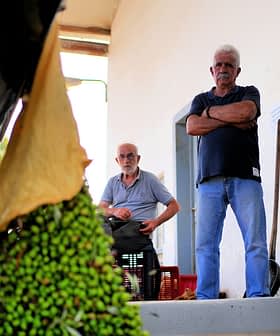 6.2K reads
6.2K readsBusiness
Rising Prices, New Technology Attract Private Equity Interest in Olive Oil

Private equity firms are showing interest in southern Europe’s olive oil sector due to favorable conditions in Spain and Portugal, including the rise of super-high-density groves and improved technologies. Investments in modern olive groves and mills in Portugal, spurred by the 2008 financial crisis, are leading the country to become one of the world’s largest olive oil producers, with fund managers confident in higher prices and enduring consumer demand.
Despite the heat and drought, southern Europe’s olive oil producers have sparked interest from private equity firms.
While olive farming and oil production are not usually seen as high-return investments, current conditions in Spain and Portugal and new agricultural technologies and practices have spotlighted the olive oil sector.
There is more and more interest in investing in (the olive oil) sector. A well-managed farm is good business.
Due to continued macroeconomic uncertainty and rising interest rates, private equity firms “remain focused on acting opportunistically to invest in high-quality assets in spaces with clear long-term secular tailwinds,” according to research by Pete Witte, lead private equity analyst at Ernst & Young.
Among the deals is the recently concluded acquisition of Spanish olive oil producer Innoliva by Canadian-based Fiera Comox Partners. Innoliva is one of Europe’s largest producers. It was sold to Fiera Comox by London-based Cibus Capital, which acquired the company in 2018.
See Also:Another Poor Harvest in Andalusia PredictedAccording to media reports, Fiera Comox’s agriculture investment team forecasts promising financial returns in the olive oil market, particularly in Spain and Portugal.
This optimistic forecast mainly relates to the increase in super-high-density (super-intensive) olive groves in Spain and improved milling technologies.
“Spain has developed a huge market and cluster for the product, and this has spilled over to Portugal,” Alexis Martineau, head of European private equity at Brazilian Warrant Co. and the founding partner of Alentejo-based olive oil producer Quinta Solana, told Olive Oil Times.
“In the early 2000s, there was a gold rush by a lot of Spanish olive oil producers into southern Alentejo, specifically,” he added.
According to Gonçalo Moreira, manager of the Alentejo Olive Oil Sustainability Program, the Portuguese region comprising about one-fourth of the country’s land area was responsible for 92 percent of Portuguese olive oil production in the 2022/23 crop year.
Martineau attributes the region’s rise in olive oil production to new farming techniques exported from Spain.
“Investments are being made to create modern, super-intensive olive groves in a country where most farms are made up of small artisanal producers who harvest manually and work collectively to produce olive oil,” he said.
While southern Portugal has developed intensive techniques, in other olive oil-producing regions of the country, especially those in the north, traditional methods are still in place, with some using presses dating from the 12th and 13th centuries.
However, investments in super-high-density groves have put Portugal on the path to becoming one of the world’s largest olive oil producers.
“In the future, we will be able to surpass the record reached in the 2021 harvest due to the increase in the area of modern olive groves in hedgerows and because we have many new olive groves that are only now coming into production, allowing us to increase the amount of olive oil produced in Portugal,” Moreira told Olive Oil Times in a separate interview.
Along with an increase in super-high-density groves, a 2020 study from Juan Vilar Strategic Consultants and Consulai said investments in technology were also paving the way for Portugal to become the world’s third-largest olive oil producer.
According to Martineau, the catalyst for this rapid investment in Portugal stemmed from the 2008 financial crisis.
“After the 2008 financial crisis, when Portugal was struggling economically, Spanish olive producers found that the climate and soil specificity in Portugal was similar to that of olive growing areas of Spain, but the land was much cheaper,” Martineau said.
“As a result, several banks sold land,” he added. “The Spanish invested in thousands of hectares of land, valued at tens of millions of Euros.”
Martineau said the combination of “low cost of land, generous water supply, production efficiency, availability of highly skilled labor and profitability of the sector, triggered massive investment.”
He added that Alentejo’s advantage compared to other parts of Portugal is access to water. The Aqueva dam, constructed in the early 2000s on the Guadiana River, one of the longest in the Iberian peninsula, has been the source of irrigation for farms in the region, changing the face of its agricultural landscape.
Experts predict that interest in Alentejo will persist as further investments are made in high-density orchards and cutting-edge mills.
Fund managers are confident enough in higher olive oil prices to make longer-term commitments to the sector.
For example, Spanish investment company Beka Finance has launched its first fund with Portuguese industrial partner Bolschare to invest in super-high-density olive and almond farming.
Beka expects returns of up to 20 percent from the new fund in the next ten years, compared with its initial forecast of 11 percent, due to prices rising far higher than the fund initially estimates.
“There is more and more interest in investing in this sector,” Beka’s managing director Fernando de la Vega told Reuters. “A well-managed farm is good business.”
Along with historically high prices, fund managers also see enduring value in olive oil demand as increasingly health-conscious consumers seek the product out. Olive oil consumption is again expected to outpace demand in the 2023/24 crop year.
However, Martineau does not expect the next few years to be smooth sailing for private equity investments. Moving forward, he expects access to water to be a sticking point, “but similar to wine regions, some olive oil regions will increase their production outside the E.U., including Chile, California, Argentina, South Africa, maybe China and parts of Australia.”
He added that though the sector remains profitable, the cost of debt has increased, making land purchases more expensive.
Martineau noted that, generally, olive oil producers diversify into almonds to hedge their bets, as both crops are grown on the same kind of soil, although almonds require more water.
Soon, private equity investors in the olive oil sector “must adjust their return to reflect new world conditions,” he said.









